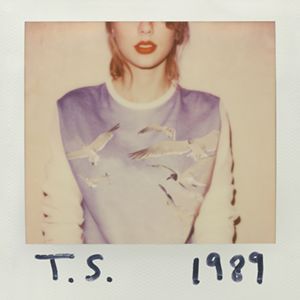Let’s get a couple of things out of the way. Taylor Swift is not an alternative artist. Her phenomenal success and multi-millions in sales will always separate her from a coterie of musicians scrabbling to create something worthy or pure, even distancing her from fellow pop artists who cannot conceive of eclipsing her reach. Taylor Swift is not–as yet–pushing sonic boundaries or changing pop music. If anything, she is precisely what we imagine the face of pop music to be; she is doll perfect and upbeat, she loves, (to quote the 2011 documentary Journey To Fearless) "glitter, surprise and costume changes", her voice is clear and bright, but not extraordinary.
But it’s tedious both to ignore and to dismiss Taylor Swift. Of course if you want to that’s fine–but I can guarantee she doesn’t give two shits if you do, and it’s unlikely to stall her in her shimmering tracks. Whether you see her as a perky nuisance, or an artist using her success to forge independent strides, it’s impossible to deny that the release of her fifth album (titled after the year of her birth) is a cultural event, deserving of attention outside of its milieu. When Lena Dunham requested the indomitable lead single ‘Shake It Off’ during a recent 6 Music interview, it sent audible, grumbling ripples through their serious music listenership.
Swift has long been rightly hailed as a skilled songwriter and 1989, which features more collaborative efforts than any of her other releases, takes that skill and polishes it to a melodic landscape you can both see your face in and eat your dinner off. I listened to it non-stop over a weekend and, when I put it on again five days later, I still knew every melody and around 65% of the lyrics.
While opening track ‘Welcome To New York’ might be the weakest song on the album–a little too ripe for insertion into a future episode of Glee and less interesting and shadowy than the rest of the record, it’s also the exception. Every other song is crammed with merit, from the complexities of her lyrics to the tight production choices which cloak her melodies and are the cause of the album’s irrepressible catch. In swapping her acoustic led, country-tinged confessionals for the colder embrace of synth patterns, drum machines and processed vocals, Swift has smoothed her Disney-edge while retaining the very particular, very appealing identity of her narrative world.
The subject is her stock in trade, namely heartache, yearning and romantic tribulation; "I’m dying to see how this one ends," she ponders/assumes in the wry, twisting banger, ‘Blank Space’. Then there’s ‘Out Of The Woods’, co-written with Jack Antonoff, a paean to a knife edge love affair and nothing less than a sonic gateway drug that will mould a new generation of Kate Bush fans. My personal favourite, ‘All You Had To Do Was Stay’ wastes neither a word, note or rhythmic shot, from the rat-a-tat of the verse to the electronic falsetto stabs of the chorus. While the thudding girl-gang anthem ‘Bad Blood’ sees her voice crack with the pop equivalent of the cry-break, all sass and bile.
The dreamlike ballads and more saccharine fairy tales are still there (‘How You Get The Girl’, and ‘You Are In Love’) but they’re balanced with a metaphorical distance and melancholy that gathers itself within the sisterhood of Cindy Lauper, The Bangles or Stevie Nicks. ‘Clean’ and ‘I Know Places’ bid farewell to schoolgirl crushes, welcoming in a dusky adulthood that’s sound-tracked by spare piano and echoing drums, her never throwaway lyrics sparkling–sad and clever over the surface.
Swift has traded girlish humour for knowing wit, and wide-eyed romanticism for lived through ache, citing pop music prevalent in the late 80s as her inspiration. While these references are clear to hear (‘Crazy For You’ era Madonna and Lauper’s ‘Time After Time’ in particular), what the album really does is ally her more with the likes of Robyn or Haim, who have both curved the popular genre to their individualistic whim. A sensible niche to occupy as a maturing pop phenomenon.
As such, this direction is bold and new in terms of Swift’s own journey, if not in the sense of pop music as a whole. It’s the sound of her trying out the vocal tropes, anthemic choruses and recognisable production trends of her contemporaries but, rather than ironing the character out of her, it somehow crystallises into something formidable. OK, perhaps you might not be able to pick her out of a vocal line up, but I like that the fact that it’s her writerly, rather than her physical voice which sets her apart.
Swift broadcasts her enthusiasms and messy, emotional humanness to such a volume that no amount of drum machines or slick production can drown her out. With 1989 she has succeeded in leveraging the most cordial and familiar of pop music outpourings to something that feels like a statement, a work of note and the sinew of some kind of emotional connective tissue–binding tastemakers, rock critics, guys I work with and my 12 year old cousin; irrevocably and unexpectedly. The only way this is possible is by making something that’s very good, or at least, as perfect as 21st pop albums get.
<div class="fb-comments" data-href="http://thequietus.com/articles/16790-taylor-swift-1989-review” data-width="550">


